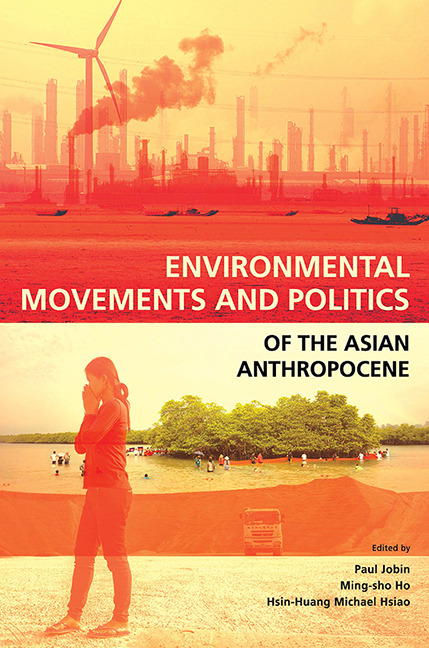Book contents
- Frontmatter
- Contents
- List of Tables, Maps and Figures
- Acknowledgements
- About the Contributors
- 1 Environmental Movements and Politics of the Asian Anthropocene: An Introduction
- 2 Environmental Movements in Taiwan’s Anthropocene: A Civic Eco-Nationalism
- 3 Environmental Movements in Post-handover Hong Kong: Between Managerialism and Radicalism
- 4 The Post-politics of Environmental Engagement in Singapore
- 5 Environmental Movements in the Philippines: Contestation for Justice in the Anthropocene
- 6 Environmental NGOs in “Post-New Order” Indonesia: Saving the Forests Through Democracy
- 7 Environmental Activism in Malaysia: Struggling for Justice from Indigenous Lands to Parliamentary Seats
- 8 State, NGOs, and Villagers: How the Thai Environmental Movement Fell Silent
- 9 Environmental Movements in Vietnam under One-Party Rule
- 10 The Cambodian Neopatrimonial State, Chinese Investments, and Anti-dam Movements
- 11 Conclusion: Environmental Movements and Political Regimes, or Why Democracy Still Matters in the Anthropocene
- Index
3 - Environmental Movements in Post-handover Hong Kong: Between Managerialism and Radicalism
Published online by Cambridge University Press: 08 October 2021
- Frontmatter
- Contents
- List of Tables, Maps and Figures
- Acknowledgements
- About the Contributors
- 1 Environmental Movements and Politics of the Asian Anthropocene: An Introduction
- 2 Environmental Movements in Taiwan’s Anthropocene: A Civic Eco-Nationalism
- 3 Environmental Movements in Post-handover Hong Kong: Between Managerialism and Radicalism
- 4 The Post-politics of Environmental Engagement in Singapore
- 5 Environmental Movements in the Philippines: Contestation for Justice in the Anthropocene
- 6 Environmental NGOs in “Post-New Order” Indonesia: Saving the Forests Through Democracy
- 7 Environmental Activism in Malaysia: Struggling for Justice from Indigenous Lands to Parliamentary Seats
- 8 State, NGOs, and Villagers: How the Thai Environmental Movement Fell Silent
- 9 Environmental Movements in Vietnam under One-Party Rule
- 10 The Cambodian Neopatrimonial State, Chinese Investments, and Anti-dam Movements
- 11 Conclusion: Environmental Movements and Political Regimes, or Why Democracy Still Matters in the Anthropocene
- Index
Summary
In the latter half of the twentieth century, Hong Kong was considered one of Asia's little dragons. Rapid industrialization in the post-World War II era has led to the worsening of the environment in the city. Subsequently, nascent environmental movements rose up to address the issues of air, water, and soil pollution. However, the opening up of China in 1978 led to the de-industrialization of Hong Kong. Over the course of a decade, almost all the polluting factories moved across the border to the Pearl River Delta. In the 1990s, Hong Kong was further transformed from an industrial city to a global centre of finance, trade, and business services. With the growth of its service industry, the issues addressed by Hong Kong's environmental movements also changed to reflect the post-materialistic concerns of the new middle class, such as lifestyle and cultural preservation.
The political context changed dramatically towards the end of the twentieth century. After Hong Kong became a Special Administrative Region (SAR) of China in 1997, the city experienced two phases of national integration with the Mainland. In the first phase (1997–2002), Beijing did not intervene in Hong Kong's affairs, and thus the city's economy, society, politics, and environmental movements remained largely the same as before. During this phase, environmental issues did not arouse great debate or controversy in civil society. The major environmental organizations were, as in the past, absorbed into the formal political structure to advocate piecemeal policy change through consensual environmental campaigns and an institutionalization similar to the process described by Heijden (1997). Before 2003, Hong Kong's environmental movements may be considered as more or less managerial.
However, in the second phase (2003–present), Beijing intervened in Hong Kong to speed up the national integration process. In response to the re-scaling exercises and the mega infrastructure projects, environmental protests began to take place over a number of preservation, conservation, and anti-development issues. The demolition of heritage sites in 2006–7 sparked opposition from a new generation of activists who mobilized protests against a variety of developmental projects.
- Type
- Chapter
- Information
- Publisher: ISEAS–Yusof Ishak InstitutePrint publication year: 2021

